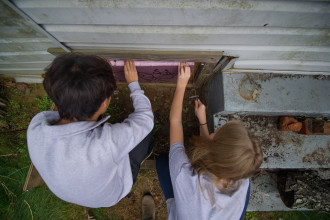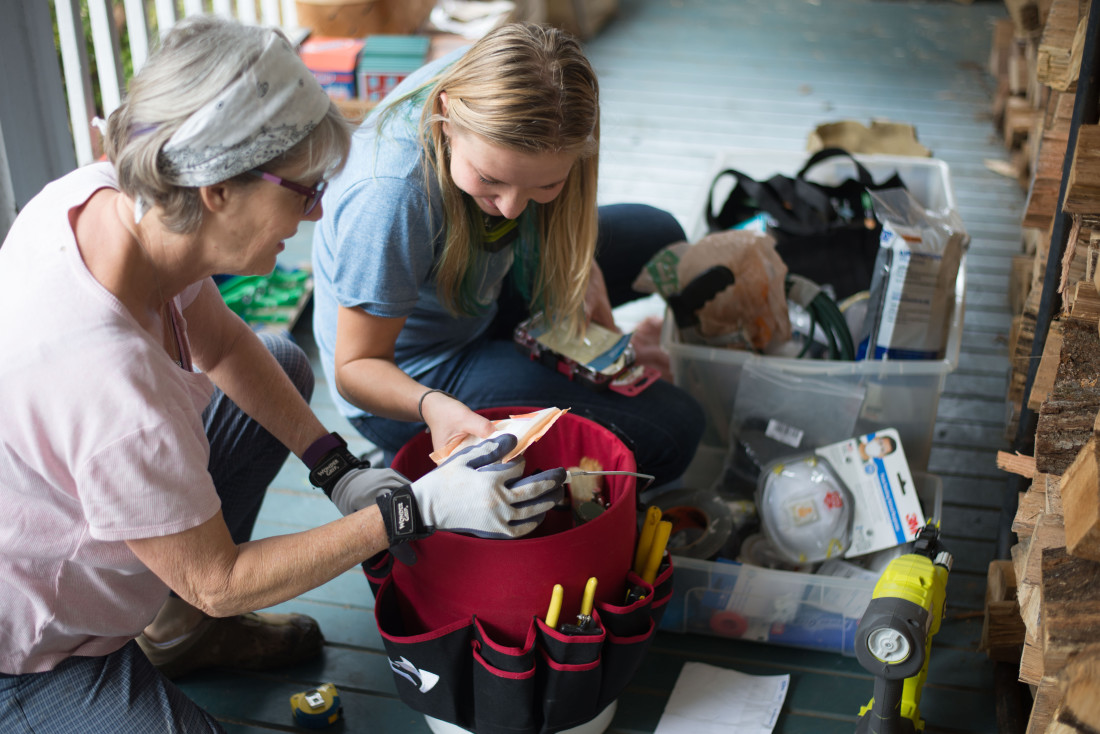Winter is here, and in Western North Carolina, that doesn’t just mean early sunsets and pretty snowfalls. It also means that most people’s energy bills will be going up — a lot.
During the summer months, relatively moderate temperatures and a low level of ambient heat keep homes from becoming unbearably hot, enabling many residents of Buncombe and surrounding counties to use less energy. But in late fall and winter, reduced daylight and higher altitudes bring biting winds and frequent frosts that trigger increased energy usage, and therefore greater impacts on people’s pocketbooks and the environment. Area residents don’t have to face these seasonal difficulties alone, however.
The new Buncombe Energy Savers project is a partnership between the Energy Savers Network and the Green Built Alliance. For 16 years, the local nonprofit (formerly known as the WNC Green Building Council) has worked on “advancing sustainability in the built environment through community education, measurable standards and regional action.” This summer, Green Built became the Energy Savers Network’s fiscal sponsor, opening the door to a $25,000 grant from the county that will be heating things up for area residents in the coming months.
Buncombe Energy Savers is using the money to provide energy-efficient upgrades to low-income residents’ homes. Energy Savers Network Executive Director Brad Rouse says the group is “committed to addressing the twin problems of climate change and economic stress on lower-income people.” Boosting residential energy efficiency, he says, meets both criteria. By helping weatherize structures, the project alleviates residents’ financial burden while reducing the environmental impacts of energy use.
Low-hanging fruit
Since its establishment last year, the Energy Savers Network has been entirely volunteer-driven. The county grant has allowed the group to hire a part-time administrator, but everyone else shows up because they want to help. “A lot of the people I talk to have huge energy bills, like $250-plus per month for a single-wide trailer,” says board member Beatrice Nathan.
The project looks for what Nathan calls the “low-hanging fruit” in clients’ homes. “We don’t do major interventions,” she says, instead focusing on simple fixes that volunteers with limited training can handle. These include weatherstripping on doors, blankets on water heaters and insulation for pipes.
In addition, Energy Savers makes custom window inserts that sit inside a window frame. “It works about as well as totally replacing your old window with a double pane, and it costs us less than $20 per window,” Nathan explains. Keeping costs low has enabled the group to weatherize more than 80 homes in less than a year, with homeowners averaging about $200 in annual savings, she estimates.
Aging infrastructure
Such programs are “extremely important and critical: People need help now,” says Rory McIlmoil, the energy savings program manager at Appalachian Voices. The Boone-based advocacy group fights for environmental justice at all levels across the state and region. But those efforts, McIlmoil says, might not be enough to address the full scope of the problem.
Last May, McIlmoil produced a report that highlighted the need for increased financial support for energy-efficiency upgrades in the four counties he looked at: Buncombe, Madison, Mitchell and Yancey. More than half of the 34,000 housing units in the study area, he found, were over 35 years old, and most hadn’t had energy-efficiency upgrades since they were built. Those older households were spending more than twice the national average on total energy costs, while also experiencing higher levels of poverty, he found. In addition, the report notes, conventional analyses often fail to factor in the money spent on nonelectrical heating sources. Only about 30 percent of the households included in the study relied primarily on electric heat; the rest used wood, gas or fuel oil.
The home energy cost burden is a metric that looks at total residential energy expenses in relation to the inhabitants’ annual income. As both McIlmoil and Rouse are quick to point out, low-income residents typically see their energy costs jump substantially in the cold months without a corresponding rise in income. Some may end up spending 20-25 percent of their yearly income on energy for their home. And that’s where programs like the federal Low Income Home Energy Assistance Program, or LIHEAP, and groups like Eblen Charities come in.
Core values
In Buncombe County alone, more than 3,500 families rely on LIHEAP to help cover their energy bills each year, to the tune of more than $500,000 annually. Without this program, “many families would suffer through the winter with no heat,” notes Sam Ruark-Eastes, executive director of the Green Built Alliance.
Eblen Charities administers much of the LIHEAP funding in Buncombe County each year, paying out upward of $2 million annually on behalf of individuals in need. In addition, Eblen is one of a number of local groups that refer potential clients to the Energy Savers program, along with Community Action Opportunities, Asheville Buncombe Community Christian Ministry, OnTrack WNC and Mountain Housing Opportunities.
All of these organizations are doing valuable work, says Ruark-Eastes, but Energy Savers offers something different. “We are unique in that we serve renters and mobile home residents,” whereas most efficiency upgrade programs are available only to owner-inhabited homes. “In addition,” he continues, “our work reduces fossil fuel energy use and demand and provides an opportunity to be of service to others.”

The multipronged approach to addressing the issues facing residents is very close to the hearts of the program’s founders. Rouse says he began doing this work through a church he attended in Hayesville years ago. “To love God is to love his creation,” Rouse explains, adding, “Reducing fossil fuel use is a direct response to that call.” He emphasizes that it’s not just up to Christians to do this work, however.
As a Rotary member, Rouse also tries to live that organization’s motto: Service above self. “That’s not particularly religious,” he says, “but it comes from the same set of core values.” Many people doing this kind of work, he finds, “simply have a conviction that they should serve and help.”
Another local organization that mobilizes volunteers to serve in the community is Habitat for Humanity. The Asheville branch has been building homes for almost 35 years, notes communications director Ariane Kjellquist. And though the group launched its repair program in 2010, many people still don’t know about it. “Our goal is to enable homeowners to live longer and more safely in their homes,” she explains. According to Weatherize.org, every dollar spent on home energy efficiency returns $2.69 in benefits, ranging from lower energy bills to reduced environmental and health care costs.
As a long-established group with more financial resources, Habitat can undertake more extensive repair work costing thousands of dollars. “Last year,” says Kjellquist, “we completed 14 new houses and repaired 43 existing homes.” Habitat, she stresses, takes a “whole-house approach” to repairs. Rather than just addressing issues brought up by the client, it provides professional site assessments to identify any additional needs.
Reaching out
As important as this work is, however, more is needed to get to the root of the problem, advocates say.
“How do you make energy efficiency sexy?” wonders McIlmoil. The deeper issue, he and others say, is getting cities and communities to think of this work as an infrastructure need, an economic opportunity and a critical human rights issue. Recent resolutions in Yancey, Mitchell and Buncombe counties recognizing the need for policy and funding solutions are “a sign that the local leaders do recognize the problem and that they care,” he concedes. At the same time, however, “Throwing small grants at the problem is a way to bypass the harder work of getting actual programs in place.”
And while their short-term approaches are different, both McIlmoil and Rouse feel strongly that education is another crucial element. “Upgrades are essential,” says McIlmoil, “but education and behavior are significant as well.” To that end, notes Rouse, all upgrades his organization provides are coupled with education on “ways to save on energy, both through positive steps and changes in behavior.”
Another thing everyone involved seems to agree on is the massive scope of the undertaking. “There’s pretty much endless need,” says Nathan.
Transition Asheville will host an information session on the Energy Savers Network on Wednesday, Jan. 17 at 6:30 p.m. at The BLOCK off Biltmore, 39 S. Market St., Asheville. To learn more, visit energysaversnetwork.com or ashevillehabitat.org. Other resources and information can be found at greenbuilt.org and appvoices.org.




Before you comment
The comments section is here to provide a platform for civil dialogue on the issues we face together as a local community. Xpress is committed to offering this platform for all voices, but when the tone of the discussion gets nasty or strays off topic, we believe many people choose not to participate. Xpress editors are determined to moderate comments to ensure a constructive interchange is maintained. All comments judged not to be in keeping with the spirit of civil discourse will be removed and repeat violators will be banned. See here for our terms of service. Thank you for being part of this effort to promote respectful discussion.